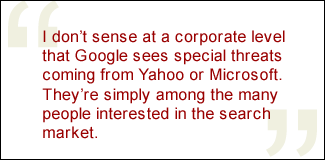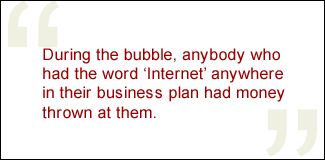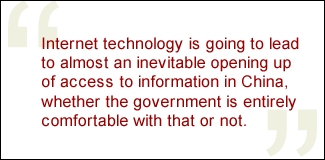Vinton Cerf, Ph.D., is a patron saint of techno-geeks everywhere. In 1973, he and pioneering computer scientist Robert Kahn designed the TCP/IP protocols and architecture that made the Internet possible. Since then, he's been part of the cadre that worked to make the Internet ubiquitous by making it inexpensive and easy to access.
 |
But Dr. Cerf has been part of another revolution, one that business leaders have been watching very closely. As a Google vice president and its "chief Internet evangelist," Dr. Cerf designs network infrastructure, architectures, systems, and standards. As Google has patents on some of the most important technological breakthroughs in the Internet era, has issued one of the largest IPOs in history, is challenging Microsoft, and posts profits in the millions, everything Google does is of interest to business. This makes Dr. Cerf's perspective very compelling indeed.
In the first part of this two-part interview, he discussed the invention and future of the Internet as well as the social aspect of what he created. (See "The Future of the Internet" in the "See Also" area on this page.) In this, the second part, Dr. Cerf reveals his thoughts on Google's next moves, Wall Street's math error, what he sees as the real threats to the Internet, and what's really going on with Google China.
GMJ: Your job title is "vice president and chief Internet evangelist" for Google. What does a chief evangelist do?
Dr. Cerf: Well, probably what I've been doing for the last thirty years, which is trying to persuade people that more Internet is better than less Internet -- or that we don't have enough Internet yet in the world today, and we need more. The current estimate of the number of users on the Net is on the order of a billion, and when you realize that there are six and a half billion people in the world, my reaction is we have a long ways to go. I also think that we need better kinds of Internet access, increased broadband access, and more symmetric broadband access so that we can send as well as receive at high speeds.
So in my case, an Internet evangelist looks for ways to help stimulate investment in the spread of Internet technology so that more and more people have access to it. There's a good business reason, from a Google point of view, for wanting that to happen because the more users there are, the more our business model continues to produce revenue because more people who look at the Net and use the Net are exposed to Google advertisements.
GMJ: When Google went public, the business model -- even the Dutch auction method -- blew people away. Do you think that Google's business model is going to change that of other Internet or communication companies?
Cerf: Well, that's a good question. It certainly has pioneered and demonstrated the utility of online advertising. There were a number of other companies that had tried to pursue that, but Google somehow did a better job of monetizing that particular practice and providing better feedback to the advertisers, which made their product more attractive than that of other competitors. So I think first of all they were able, in spite of the dot boom and dot bust, to demonstrate the utility of this particular revenue model.
In the long run, I would think that Google would want to expand its revenue opportunities beyond purely advertising. It's the standard diversification argument -- that you don't want to have your company be entirely and totally dependent on only one means of revenue generation. But so far, the company has done extremely well in this domain.
GMJ: I don't mean to make the people who didn't buy stock squirm, but if Google decides to diversify, what would it do?
Cerf: Well, first keep in mind that Google's objective is to help organize information and to make it more useful. So it already has an enterprise business where we install equipment or we provide equipment to be installed at enterprises that want to take their corporate data and organize it in the same way that Google organizes the World Wide Web.
Second, Google has been moving in vertical directions looking at specific segments of information -- for example, Google has been organizing information and supporting searches that are restricted to academic content in the research and academic communities. That can be very helpful in promoting research, and it could potentially produce revenue, although at the moment I think it's not monetized.
As Google gets more and more involved with media other than print or text, once again, there may be some interesting possibilities associated with monetizing access to and organizing non-text information. So I think there are lots of possibilities here, and you can be sure Google is considering quite a variety of them.
GMJ: Bill Gates has said publicly that he's gunning for Google's share of the search market. How much of a threat are Microsoft and Yahoo?
 |
Cerf: The threat, I think, is not so much inherent in the companies themselves; it's more a question of how good is their search technology, how good is ours, and how well each of us manage to improve our search capabilities over time. So in a sense the threat is present not just at Yahoo and Google, but in other places too. Think about where Yahoo and where Google came from. They came from Stanford graduate students. And Stanford is not too far away from [Google's headquarters in] Mountainview, [California,] and there are smart people there, too.
So I think generally we don't see the threat as corporate, or embodied specifically in Yahoo or in Microsoft, because it is just generally the technology threat that if you fall behind, you fall behind. So we work very hard to improve our own search technologies, and hopefully we can stay ahead of everybody else. I don't sense at a corporate level that Google sees special threats coming from Yahoo or Microsoft. They're simply among the many people interested in the search market, and they're working very hard to improve their products and compete with us.
GMJ: Google's fourth quarter profits last year were up 86% compared to the same period in 2005. This was still below Wall Street projections, and that scared a lot of investors into selling. To me, that sounds like insanity. What does that sound like to you?
Cerf: This is very common in the Wall Street world. If all you do is meet your projected results, you're often punished by Wall Street. Wall Street is already discounting whatever your expected results are, and then they only reward you if you exceed them -- at least that's my experience. So we're seeing a classic situation where if we only do as well as we say we're going to do, we get punished.
 |
My guess is that over the long term, markets tend to adjust to the expectations of the investors, and I hope that expectations will moderate towards reality. You can't have 100 percent growth every year for 10 or 20 years -- when you do the math, that's an awfully big number. Two to the tenth is a factor of a thousand, and it's hard to imagine a company starting at five billion dollars a year and doubling annually. In 10 years, you'd be at $5 trillion, and I guarantee you I don't think there's enough money in the world to support a five trillion dollar a year advertising business model. So you can't possibly have the sort of returns that continue with the very high rate that they do at the beginning.
GMJ: How has the Internet changed business? And what were the long-term effects of the bubble bursting in 2000?
Cerf: I think that there has been a core of continued economic expansion and a core of continued growth in the user base that has sustained the Internet since the April 2000 crash. So now what you're seeing is that the survivors of that event are much stronger than they were before -- what doesn't kill you makes you stronger. So you see Amazon and eBay and Google, among others, all thriving. And I think you start to see more and newer applications arising while the venture capital people more carefully consider their investments than they did before.
During the bubble, anybody who had the word "Internet" anywhere in their business plan had money thrown at them. Many of them didn't understand the difference between capital and revenue, so they spent all their capital, and then they were surprised when they ran out. So I am persuaded that we still have quite a long ways to go before we've exhausted all the possibilities that this kind of communication offers for business.
GMJ: Software presents some challenges, though.
Cerf: Our efficiency in hardware has not been matched by our efficiency in the development of software. We're slow at it; we still build bugs into the systems, and we don't have a good theory of computer science for programming, at least not as good a theory as we have for engineering hardware. And I'm disturbed by that. I think that we should be challenging the computer science departments and the researchers in them to dig much more deeply into an understanding of software and how it's produced. There have been many attempts to do that, but none of them have adequately delved into the real understanding of computing.
I keep challenging the computer science people with the question, "Where is the science in computer science?" And there is some -- computability, decidability, theory of languages, parsing, and things like that, and maybe a little bit in operating system design. But I feel like we're a very long way from understanding how to cope with the complexity that the software world challenges us with.
GMJ: Do you think things will improve?
Cerf: I don't know. Software is very complex stuff. The network makes it harder, because every device that's on the Net is filled with software that nobody predicted. In other words, the combination of software on your laptop is different from [the combination on] mine, depending on what we downloaded or what combination of software we've installed. So our interactions with each other are experiments, in the sense that if your machine and my machine have never exchanged any information before and now they do, that's a new experiment. So there is an overwhelming complexity associated with networking of computers with unpredictable software. It's hard to judge whether that will get better.
I think that we need a better theory of operating system design that will protect the ensemble of hardware and software from hackers, and I don't mean just hormone-filled teenagers. Some of these people are professionals who are out to steal business secrets or penetrate machines for purposes of gathering information, and maybe they do so on a paid basis. This whole business of disruption and deceit in the network poses a huge challenge for anyone who's looking for a rational and legal environment.
GMJ: Which brings up another issue -- what did you think about the United Nations' desire to assume oversight of ICANN [the Internet Corporation for Assigned Names and Numbers]?
Cerf: First of all, I'm glad that you used the term "oversight," because too many people have said the U.S. wants to control the Internet, and of course ICANN doesn't control the Internet. ICANN manages the assignment of domain names and IP addresses and is overseen by the U.S. Department of Commerce, but that does not equate to the Department of Commerce controlling the Internet. Certainly ICANN doesn't. [See "ICANN Information" in the "See Also" area on this page.]
 |
If you review the history, it's understandable how the Department of Commerce ended up with this responsibility. The U.S. Department of Defense had that responsibility in the earliest days when it was responsible for inventing and operating the core of the Internet. And if anybody had any direct control over the Internet, it would have been me and Bob Kahn, but that was 30 years ago. So I think that the oversight function is one that is understandable from a historical perspective. It has been distorted into and misrepresented as control, and that distortion has been a great deal of the debate leading up to and including the two world summits on the information society.
I want to emphasize, however, that to focus only on the specific job that the Department of Commerce has is to fail to understand the real challenge of Internet governance, which is people's use and abuse of the Internet. Governments normally step in to deal with public policy questions of that sort. These are way outside of the orbit of ICANN. It has very specific and very limited responsibility for maintaining the uniqueness of domain name identifiers and Internet address identifiers. That's really its fundamental responsibility. Governments should be involved in the public policy aspects of Internet that lie well outside of the purview of ICANN.
GMJ: But some governments will do anything to repress the transmission of information that the Internet offers.
Cerf: Personally, I am excited about the possibility that the Internet brings to freedom of expression and in my heart of hearts, I hope that the Internet will be a very powerful force to encourage or support or enhance freedom of expression. But at the same time, to borrow a Cold War expression, governments are going to behave the way they want to behave. The sovereignty of governments is not something that's going to dissolve overnight. But even in the most repressive of environments, it's always been my hope that if the Internet is permitted in, then it will be the camel's nose under the tent, so to speak.
GMJ: Which brings us to Google China. The public seems to feel there's a disconnect between Google's support of the free transmission of information and the Chinese government's censorship of search findings.
Cerf: The problem, of course, is that the Chinese government is very nervous about open access to the world's information. So the question is, under what circumstances are we able to conduct business there?
We've done several things to try to mitigate what we consider to be a situation which is not entirely satisfactory. First of all we have agreed to remove responses from our system in accordance with the laws of the Chinese government, but we insisted that when such a removal happens, that we mark the information as having been suppressed. So the users at least are aware that something is missing. The second thing that we chose not to do is to put up services that would involve personal information. So we didn't put up e-mail or other information messaging kinds of services because we were concerned that we might be legally forced to divulge information that could be associated with individual people.
The other thing I would observe is that there are enterprises outside the United States that apparently have found ways to mitigate the limitations of Chinese Internet access, as it were, and so some knowledgeable Chinese users are able to reach the global services of Google and, of course, the rest of the Internet. There was a great article in the Washington Post about that. [See "The Click That Broke a Government's Grip" in the "See Also" area on this page.]
GMJ: Very knowledgeable computer people can always get around obstacles.
Cerf: So can knowledgeable teenagers, as near as I can make out.
GMJ: Is Google trying to erode the Chinese government's resistance?
Cerf: Well, no, I don't think Google is being politically active at all. What I am suggesting to you though is that the flow of information is kind of like water -- it goes pretty [well] anywhere that it can flow, and over time, information tends to erode barriers. So I don't suggest to you that anything will happen overnight. But over time I think that Internet technology is going to lead to almost an inevitable opening up of access to information in China, whether the government is entirely comfortable with that or not.
Like many others, I've learned that patience sometimes counts. So does persistence. And if you'll notice, the Grand Canyon was carved by water flowing over the earth. It just took a few hundred million years to do it.
-- Interviewed by Jennifer Robison
In the first part of this two-part interview, Dr. Cerf discussed the invention and future of the Internet as well as the social aspect of what he created. To read part 1, see "The Future of the Internet" in the "See Also" area on this page.